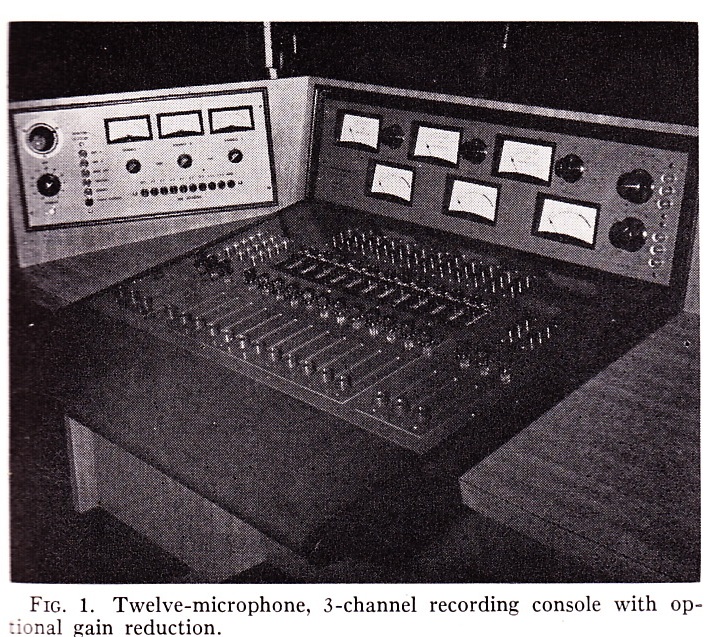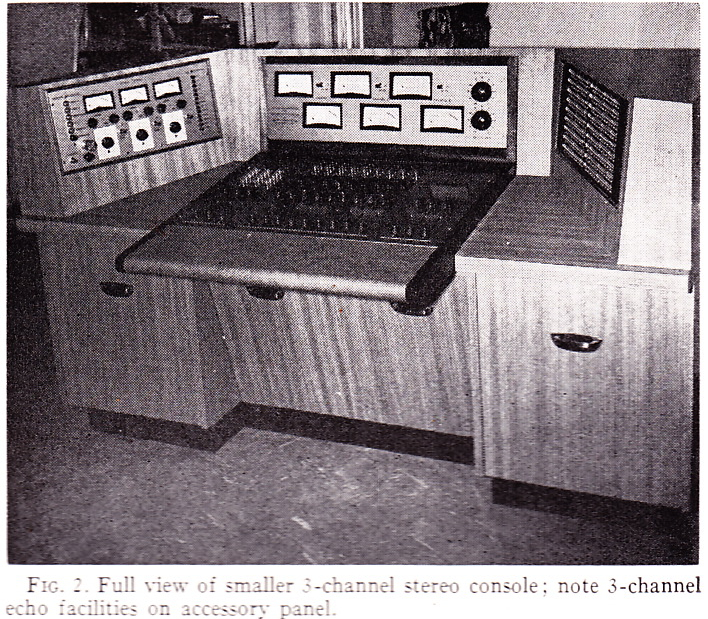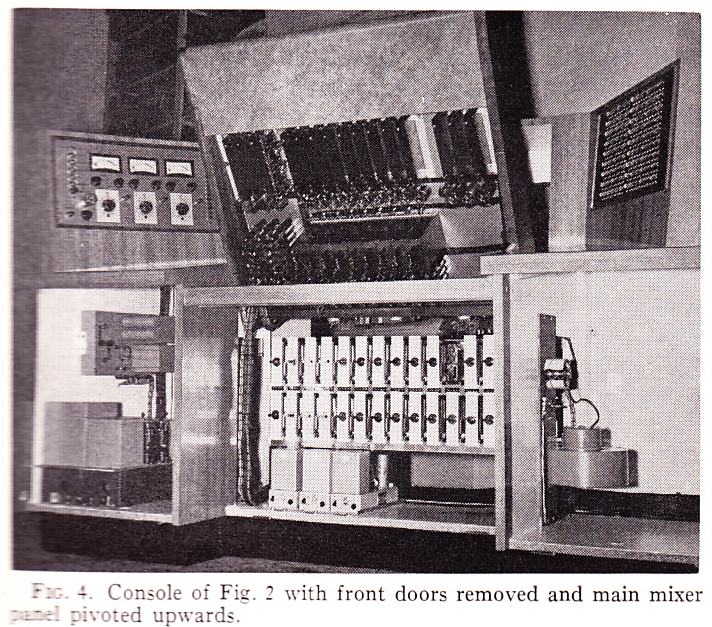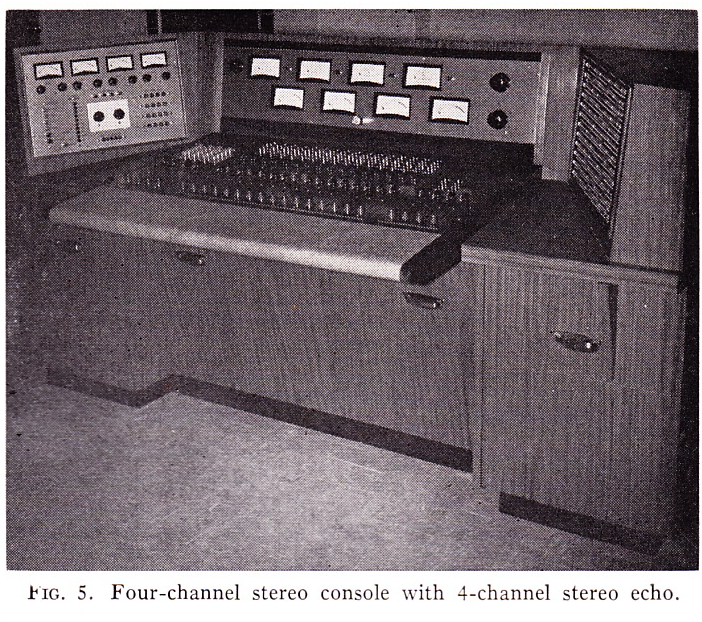 Above: 12×3 Audiofax mixing desk circa 1961.
Above: 12×3 Audiofax mixing desk circa 1961.
I was reading a 1961 AES journal when I came across this piece by Phillip Erhorn of Audiofax associates in which he details “New trends in stereo recording consoles.” Erhorn will let you have your channel EQs and compressors, but only very begrudgingly.
Here’s Erhorn describing how he feels the trend for extensive channel EQ developed:

 I mean, yeah, I agree, many condenser mics are hyped in the high end. But why the hostility, buddy? Oh and about all those channel compressors?
I mean, yeah, I agree, many condenser mics are hyped in the high end. But why the hostility, buddy? Oh and about all those channel compressors?
 Remember what I said a few posts back about The Pre Rock Era? How long did it take for our culture to shake off the idea that ‘verisimilitude to an actual acoustic event is the fundamental function of audio’? I’ll remind you that in only about 3 years’ time, EMI staff engineers would be pushing their modded’ Altec compressors hard to get the sounds that helped create the Beatles’ success. Oh the times they are a’changing.
Remember what I said a few posts back about The Pre Rock Era? How long did it take for our culture to shake off the idea that ‘verisimilitude to an actual acoustic event is the fundamental function of audio’? I’ll remind you that in only about 3 years’ time, EMI staff engineers would be pushing their modded’ Altec compressors hard to get the sounds that helped create the Beatles’ success. Oh the times they are a’changing.
Let’s get back to those swell-looking Audifax consoles tho…

 Above, the same 12×3 desk, inside and out. What a work of art this thing is! Someday. I . Will. Build. My. Own. Console.
Above, the same 12×3 desk, inside and out. What a work of art this thing is! Someday. I . Will. Build. My. Own. Console.
************
*******
***
I am going to take a bit of a left turn here. Not exactly like Jung’s Left Hand Path but… Let’s get back to the hostility towards this new idea of audio-as-sound-modification-technology (as opposed to documentation-technology) that we read in the passages above. Erhorn was/is obvs a very talented man who cared deeply about music or he would not have gained the skills/drive to construct the intricate pieces we see above. So his views can’t just be written off. Which begs the question: If Erhorn’s views as an accomplished audio professional were, in 1961, slated for imminent obsolescence, then which of our current paradigms are headed for the dustbin? I don’t think the answer has anything to do with fidelity or even any particular kind of recording technology, necessarily. In 1961, the history of audio trends was simply an upward vector. Higher fidelity was ‘better.’ Frequency response and distortion % was always getting ‘better.’ Progress towards increased fidelity was the paradigm, and any deviation from this progress (such as the need to ‘EQ’ a mic to achieve a supposed marketing prerogative or the need to compress a loud, ‘music-less’ but sale-able band of youths) was bad, right?
Well, the ‘fidelity problem’ was pretty much solved by the late 1970s… the high-end of professional and consumer equipment available at that time is as close-to-perfect, in terms of sheer audio performance, as any user is likely to need. Which is why the manufacturers turned towards the convenience problem instead. This brought us the Walkman, the CD, and ultimately, the MP3. So with the ‘fidelity problem’ solved, and all of our attention now collectively focused on the ‘convenience problem,’ we abandonded the paradigm of the upward vector of fidelity and instead enter an age of fidelity-trends. High-fidelity sounds are in vogue for a while; and them low-fi and distorted sounds become popular. We then tire of the low-fi and artists start making slick-sounding records again. Etc., etc. Now, there are real moments in the culture that precipitate each of these shifts, but the pattern seems likely to keep repeating. The point is: neither hi-fi nor low-fi are going anywhere. We now have a plurality of acceptable approaches to the generation of recorded musical performances. So what’s to obselecse then? Which viewpoint is about to become hopelessly outdated?
It’s my current feeling that the answer has something to do with copyright, ownership, and fair use. Not fidelity, not any particular recording technology, but copyright and the idea of what kind of ‘use’ of existing recorded materials constitutes a valid new work. I really get the sense from younger artists, as well as my students, that existing recordings — audio-masters made and paid for by other people — are fair game for use in their own productions: no credit or compensation necessary. Of course ‘sampling’ occurred in hip hop for ten years before rap artists had to start paying fees to use recognizable samples in their tracks, but I am more talking about the newer trend of simply lifting an obscure existing song, performing some tweaks on it, and calling it your own production. And maybe it is! Who is to say, really. And that’s kind of the point I am trying to make. If you are a young contemporary musician, what is the material that you work with? What are the compositional elements that you are concerned with? It is the notes E2 – E6 on an electric guitar? Or is anything and everything that you can download for free from the internet? If you want some concrete examples of the kind of music that I am talking about, check out this thread on Hipster Runoff. If you are unfamiliar with HRO, the tone might take a little getting used-to, but the musical examples that the author presents are very valid. Listen to the tracks. Be aware that these are some of the most popular, most relevant rock-music acts in the world today. And ask yrself: how do you feel about this? Can you accept the paradigm shift that is emerging? Can you appreciate that this paradigm shift is taking place at the precise moment that the economic base of the century-old Recording Industry is almost fully collapsed? And while you are pondering that, recall the Marxist relation between base and superstructure, this idea that economic conditions necessarily construct cultural conditions?
Here’s those free music-production apps you asked for. Now go… make some music.

11 replies on “Here’s those EQs and Compressors you asked for. Now go F’ yrself.”
Chris:
“Which begs the question: If Erhorn’s views as an accomplished audio professional were, in 1961, slated for imminent obsolescence, then which of our current paradigms are headed for the dustbin?”
Comment:
God I hope it’s “toothpaste” over-compression in recording and mastering. Please sent it to the dustbin, now! Drummers — unite and rebel against your guitar players. You’ve lost the battle, you are now reduced to little taps on a wet piece of paper. Go dig out your Led Zep LPs and listen to Bonzo. Then go grab the scruff of the neck of your mastering guy or the record company guy pulling the strings and tell him that super-compressed is NOT LOUDER!
Great website:
http://turnmeup.org/
See especially Bob Orban’s article about how super-compressed is NOT LOUDER ON FM RADIO, just unlistenable because it’s so distorted.
OK, off my soapbox. Keep up the great work Chris!
As a drummer/soundmaker/electronic musician/synthist/recordist , “dynamics” in playing and “dynamics” in recording seem at odds…not so the case via Bonzo. Here’s me playing the parts of Bonham and the other tracks on this recording to prove my point and rest my case: https://soundcloud.com/jarrod-barker-1/heavyballoon-jbarker (by the way, 3 mics on the drums, recorded in my kitchen)
Hi – I got turned on to your site by a respected colleague (who is also the chief engineer for one of Australia’s largest radio networks).
Anyway I hugely enjoyed this article and look forward to reading much more.
As to your question, is there any way we can get rid of Autotune?
this post is an instant classic.
Great post! I’m digging the whole site. Found it through the Tape Op Messageboard.
As to the chillwave/sampling question — Sure, sampling is just as valid as any other creative form. The only issue is that when our post-modern re-creations are being released commercially, we should (and must) pay a fee to the original artist.
If it’s not being released commercially, then who really cares? But unfortunately we run into some blurry territory on that question: Is posting an amateur video to YouTube commercial? Doesn’t YouTube sell advertising and collect money on that traffic, whether directly or indirectly? Is cutting the original artist out of that commercial transaction a fair move?
Sampling culture is great. When commercially-released, sampled works have just gotta pay the original creators a fair little slice of revenue. No big deal. We’ve been doing that for decades without issue.
And when they’re not commercial? Well — clearly we need more and better *non*-commercial outlets for amateur re-mixers who have no commercial intent. Because there are precious few options on that front.
There is nothing non-commercial about say, YouTube. Google is one of the biggest and most financially successful corporations on the planet! The same kind of argument could be made around ad-supported file sharing networks, Facebook… the list goes on.
It’s an issue I’ve been thinking about a lot, and have explored a bit here:
http://trustmeimascientist.com/2013/03/04/in-defense-of-the-amateur/
Anyway, thanks for the great site, and keep on doing what you do.
hi justin, welcome, and i’m excited to check out yr site – you write for tape op? or similar? I know i’ve seen yr name around… c.
Many people do not understand that the reason that the classic modern pop and rock records are as good as they are is because they used audio modification sparingly (by modern standards) and always they knew when too much was too much. Those engineers knew the rules and they broke them, when they did, at least honoring them in the breach.
Now we have people who have no idea of how to do it right or the difference between.
The Beatles could play pretty well before anyone ever recorded them, step one. George Martin was a first rate engineer and producer before they crossed paths, step two.
Too many people are trying to run before they can walk today. For one thing, much of the talent out there-and there are big exceptions-either has no biological talent, has no training in any sense, or is simply no where near ready to record except for their own amusement. For another, there is a huge lack of patience and a disinclination to “pay dues” amongst both musicians and recordists these days. But worst of all, the standards people demand of themselves-which is ultimately what determines success-are just about gone. Instead of holding out for good songs played by good musicians and sang by good singers (and no, I am not making myself the arbiter of what’s good-the artists and recordists have to come to that themselves) and recorded in a quality fashion, people want to make a noise NOW!!!! I think a lot of people had that urge all through history, but before the cost of recording tended to act as a filter. Now you can buy, what is even by my own standards, a pretty impressive recording suite for $999 at Guitar Center, and they’ll give you a credit card (never mind GE Consumer Finance’s 29.92% vig) to put it on. It’s a Swiss Army chainsaw to the average buyer because he’ll be on YouTube in a week and the results will haunt him forever.
By the way, Mr. Fine is 100% right about turnmeup.org. I’ve already emailed links to all the screen jockeys at my local crappic rocker and moldies stations.
Hi Chris, first time I’ve visited the site, and I’m having a great time! ! The above article segues into a Philip Bachman item I recently found regarding Hi-Fidelity, stating that the pursuit of the ultimate” re-creation ” of audio performance had looped into creating a hyper- real recordings that bear no resemblance to the source audio, and in fact could not exist outside the studio/ playback realm. And while we all go”well, duh” I think it’s a comment worth remembering, especially as he wrote it circa 1950. It presents a good example of changing paradigms, technology creating self fulfilling possibilities, and a reminder to ask yourself “what is my goal in recording this? “.But besides all that, I love gear porn, whether it be musical instruments, studio or stereo gear, so mucho thanks for the pics and info. Dwayne.
ps writing this on my phone, so forgive errors, my eyes not whether they were
hey man -thanks and enjoy – i think there are over 800 articles here,,,, c.
Back in the world of 3 track recording monitors were selected for their ability to reveal musical problems prior to the musicians leaving the studio. Recording engineers like myself took copies of our recordings home to check out on our hi fi systems. If we’d gotten too carried away with signal processing, we got a very rude awakening! The best argument I know for high fidelity is musical translation between different listening environments. Trusting monitoring too much is a serious trap. The other factor is that while “consumers” may use MP3s, the reviewers and broadcast programming meetings that determine an artist’s exposure are quite likely to use high quality playback.
[…] Source: Here’s those EQs and Compressors you asked for. Now go F’ yrself. | Preservation Sound […]